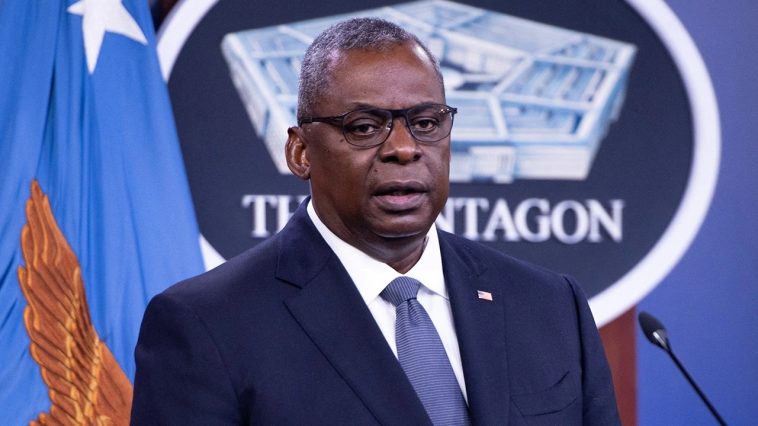LISTEN HERE:
During the opening acts of 2024, the United States Secretary of Defense, Lloyd J. Austin, found himself needing to navigate a more personal and unexpected battlefront. The details have been kept tightly under wraps by Pentagon officials, who remain resolute in their decision to not share the exact reason for Austin’s hospital admission. Since the start of the new year, Austin has been under the steady watch and care of doctors at the Walter Reed National Military Medical Center.
Interestingly, the hospitalization was preceded by what was initially characterized as a routine medical intervention. The Pentagon’s official spokesperson, Maj. Gen. Pat Ryder, informed the media that Austin had opted for an elective procedure towards the close of 2023. The sitting Secretary was on a planned leave during this time, indicating no alarm or cause for concern.
Confirming Austin’s initial quick recovery, Ryder shared that the Secretary was cleared to return home the very next day following his procedure. The procedure had taken place on December 22 of the previous year at the esteemed Walter Reed facility. All seemed well; until the dawn of the new year brought with it a pall of anxiety and discomfort for Austin.
No sooner had the first day of 2024 begun, than Austin started complaining of distressing pain – serious enough to warrant an immediate medical re-evaluation. It led to him swiftly being transferred back to Walter Reed. The escalating severity of his condition marked by the unexpected ICU admission.
Striving for quick and concentrated medical attention, Austin was immediately housed in the Intensive Care Unit. This was a necessary move, Ryder explained, made to enable instant access to any warranted medical intervention. It wasn’t just the severity of Austin’s symptoms driving the decision – privacy protection and efficient hospital facility management also factored into the equation.
Respecting the boundaries of patient confidentiality, Ryder steered clear from revealing any specific information regarding Austin’s condition. The tight-lipped approach appeared to be strategic, maintaining the dignified privacy of the esteemed Public Servant. At the same time, it effortlessly illustrated the care the administration takes to uphold the right to personal privacy.
In a rather positive and encouraging development, as the week drew to a close, Austin reportedly assumed his official duties – albeit from the confines of his hospital ward. It seems evident, as shared by Ryder, that Austin is on a constructive path to recovery, all the while maintaining an impressively upbeat demeanor.
Solidifying Austin’s resilience, Ryder further added that the Secretary successfully received the operational updates and effectively dispatched necessary guidance to his team on Friday itself, post resumption. Equipped with all the necessary communication facilities, Austin demonstrated his commitment by continuously staying abreast with the Pentagon’s worldwide operations.
Highlighting the Secretary’s continual presence at the helm of the defense organization, Ryder revealed that Austin has been actively communicating not just with internal teams, but with key external stakeholders, too. He had also had a telephone discourse with President Biden on Saturday, confirming his engagement with the larger leadership fabric.
Additionally, Austin remained in synchronization with Deputy Secretary of Defense, Kathleen Hicks, as well as Chairman of the Joint Chiefs of Staff, General CQ Brown Jr., and his core team of senior staff. His active participation, despite the evolving personal health situation, displayed an irrefutable testament to his existing role as the U.S. Secretary of Defense.
Despite Austin’s ongoing engagement with his professional responsibilities and his visible recovery, no confirmation has been given about his discharge date from the hospital. Ryder made it clear that there is no fixed timeline in place, further deepening the enigma surrounding the situation.
While Ryder did not disclose specific details regarding Austin’s upcoming engagements, he did state that there are no immediate plans for Austin to conduct press briefings in person during the coming week. Whether this suggests ongoing recovery precautions or a merely a reshuffling of traditional press interaction methods remains to be seen.
Austin’s unexpected health hiccup and subsequent hospitalization, although alarming, have not stymied the flow of command or the implementation of defense policies. His administrative team appears to be functioning smoothly, providing the needed thrust to ongoing defense operations. The worthy act of upholding his professional responsibility, even from a hospital bed, elevates the honor attached to his role.
Interestingly, all this unfolds against the backdrop of broadening global challenges and escalating defense concerns. The continuation of business, as usual, emphasizes the staunch resilience of the U.S. Defense mechanism – a reflection of Austin’s inspirational leadership therein.
Reflecting upon this series of events, one thing remains clear. Secretary Austin, under the vigilant care of his medical team at Walter Reed, balances unwavering public service commitment along with personal ordeal. Even as one chapter of his journey is yet to conclude, the professionalism displayed by him and his team reaffirms the durability and resilience of the American defense spirit.



